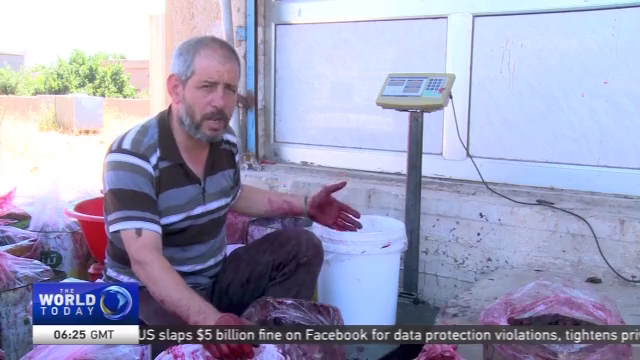
14:57, 25-Jul-2019
Life in Syria: Qunaitera's farmers expecting harvest after government gained control
Updated
15:09, 25-Jul-2019

A small Syrian town along the border with Israel has seen both civil war and regional tensions. There, farmers who've been there for generations are slowly trying to return to normal. The Syrian government regained control of the area last year, paving the way for the first harvest this year. CGTN's Alaa Ebrahim has more.
Not the safest place to have a farm. Under the nose of an Israeli army observation post and along a dangerous front-line separating the Syrian and Israeli armies--where hostilities are always on the brink of exploding. But Hassan Al-Shaar has little choice. He inherited this field from his family which had tended to these berry trees for nearly a century, long before there was a frontline.
HASSAN AI-SHAAR FARMER "I have worked in this field for 42 years, and last year when the army took back the area we were able to come here once again and take care of our plants. We have no other way to make a living so the past few years were very difficult."
But memories of war aren't the only things these farmers are struggling with.
HASSAN AI-SHAAR FARMER "Roads to the fields were ruined by the fighting and the government says it will fix them but so far nothing. We need pesticides and diesel fuel for our tractors but now they are hard to get. Before the war they were subsidised and abundant."
Here in Hadar, agriculture and related trades are the main sources of income. But in the years of the Syrian war when the town was surrounded by rebels and attacked repeatedly, going out to the fields, let alone tending to them, became a dangerous task. And though government forces regained control of the province nearly a year ago the fighting didn't end completely.
HOSNIAPPLE FARMER "Last year clashes took place here so I couldn't spray the crops with pesticides or tend to the trees, so I lost a whole year and now I have to wait till next year. But at least I am here now."
But for the produce that was harvested this year the road ahead is still long. It has to be packed and delivered hundreds of kilometers across checkpoints and if you want to export them, you have to freeze the produce using a room like this one. A task that is proving more and more difficult in a country that faces power shortages.
AHMAD BERRY DEALER "We buy the berries off the farmers for around 600 Syrian pounds then clean them, pick out the bad ones, pack the rest and then take them to Damascus to sell. We almost spend as much to get the berries to market as we pay the farmer who worked for a whole year."
ALAA EBRAHIM DAMASCUS "The berries travel for nearly two hundred kilometers to be sold in this Damascus market for around two dollars a kilogram, double what the farmer gets. For many around the world, it may not sound as much but it could the difference between life and death for farmers, Packers and sellers in a country where life is becoming harder and harder. Alaa Ebrahim CGTN Damascus."
SITEMAP
Copyright © 2018 CGTN. Beijing ICP prepared NO.16065310-3
Copyright © 2018 CGTN. Beijing ICP prepared NO.16065310-3